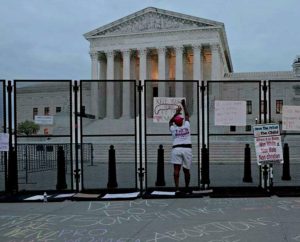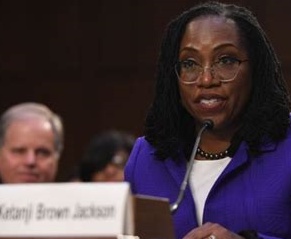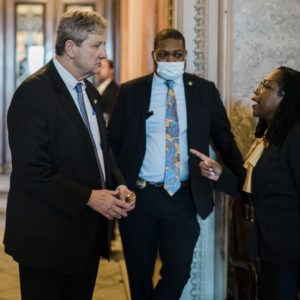Animal Rights, Civil Liberties, Civil Rights, Human Rights
Podcast: Play in new window | Download


Supreme Court Justice Samuel Alito’s Leaked Draft Opinion
In 1973, the Supreme Court held in Roe v. Wade that the Constitution protects a woman’s right to abortion until the fetus becomes viable, that is, when it can survive outside the womb (which is about 23 weeks of pregnancy). Nearly 20 years later in Planned Parenthood v. Casey, the Court reaffirmed the central holding of Roe and said restrictions that placed an “undue burden” on a woman’s right to abortion were unconstitutional.
In perhaps the most significant leak in the history of the Supreme Court, Politico published a draft opinion that Samuel Alito wrote in Dobbs v. Jackson Women’s Health Organization, which would overturn Roe and Casey. At least four other members of the Court would have to sign Alito’s draft in order to overrule the constitutional right to abortion.
But Politico also reported that, in a straw poll following oral argument in December, Clarence Thomas, Neil Gorsuch, Brett Kavanaugh and Amy Coney Barrett voted to overrule Roe, Casey and the constitutional right to abortion, and they all continue to hold that position. The Court will issue its final opinion in Dobbs by the end of June.
Although two-thirds of the American people believe that Roe should not be overturned, it appears that the Supreme Court is poised to do just that. Moreover, if the Court says that abortion is not a constitutional right, many other so-called “unenumerated rights” that are not specifically mentioned in the Constitution will also be in jeopardy.
Guest – Erwin Chemerinsky, Dean of Berkeley Law School. Dean Chemerinsky is one of the nation’s preeminent constitutional scholars. He has written 14 books, including leading casebooks and treatises about constitutional law, criminal procedure, and federal jurisdiction. He also represents clients and has argued several times before the Supreme Court.
—-


Government Agencies Delay Food Safety FOIA Requests Part 2
The US Freedom of Information Act is a 1967 federal law requiring federal agencies to disclose information to the public. The logic being: “a government of, by and for the people, is transparent and accountable to those people.” In the last half-century, FOIA requests have became critical tools for both journalists and activists seeking to illuminate federal agency activities.
However, since 2014 it’s gotten harder to wrest information from recalcitrant government agencies. Federal agencies began both heavily redacting information, or ignoring requests entirely. Delays have also been noticeably lengthier. The law gives agencies 20 business days to respond. Yet by 2019, the average wait time for a reply to your FOIA request was nearly six months (177 days).
Today’s guest experienced this frustrating process— waiting seven years for the US Fish and Wildlife service to respond. He filed his FOIA in 2014, receiving nothing for ten months, and finally a reply with much the data blacked out. This forced him to sue.
Guest – Attorney Nicholas Arrivo, managing attorney and champion of endangered species at Humane Society of the U.S.

————————
Animal Rights, Civil Liberties, Civil Rights, Human Rights
Podcast: Play in new window | Download
Michael Smith Editorial On Kathy Boudin
—-


Landmark Case Roe v. Wade Analysis
In headline news, on May 3 a leaked draft Supreme Court opinion was published in Politico. Samuel Alito’s draft decision in Dobbs v. Jackson Women’s Health Organization would overrule the landmark cases of Roe v. Wade and Planned Parenthood v. Casey. Alito writes that abortion is no longer a constitutional right and he leaves it up to the states to enact and enforce laws restricting a woman’s right to choose.
Alito wrote that “Roe and Casey must be overruled,” finding no constitutional right to abortion. If four more conservative members of the Supreme Court agree — which Clarence Thomas, Neil Gorsuch, Brett Kavanaugh and Amy Coney Barrett reportedly do at the present time—all reproductive and privacy rights will be imperiled.
If the court overrules Roe, it’s expected that half the states will outlaw or severely limit abortion. Thirteen states with so-called “trigger laws” would immediately ban the procedure. Five states that have pre-Roe abortion bans could once again enforce them. And 14 states would ban abortions before fetal viability.
Prohibition of and restrictions on abortion would disproportionately affect poor women and people of color. People suffering early miscarriages or ectopic pregnancies could be adversely affected if Roe is overturned. Fertility procedures such as in-vitro fertilization, egg extractions and stem cell procedures could be outlawed. Other “unenumerated” rights not specifically mentioned in the Constitution would be jeopardized. They include the right to travel, the right to vote and the right to interracial marriage.
Guest – Attorney Marjorie Cohn – Professor emerita at Thomas Jefferson School of Law where she taught from 1991-2016, a former criminal defense attorney, and past president of the National Lawyers Guild. She lectures, writes, and provides commentary for local, regional, national and international media. On May 6, Marjorie published an article on Truthout titled: Will Demise of “Roe” Be a Death Knell for Contraception, Marriage Rights?
—-


Government Agencies Delay Food Safety FOIA Requests
The US Freedom of Information Act is a 1967 federal law requiring federal agencies to disclose information to the public. The logic being: “a government of, by and for the people, is transparent and accountable to those people.” Getting the act passed was a democratic victory of the movement in the 60s. Over the last half-century, FOIA requests became critical tools for both journalists and activists seeking to illuminate federal agency activities.
The problem is– it’s getting harder to wrest information from recalcitrant government agencies. Federal agencies began both heavily redacting information, or ignoring requests entirely. And delays got noticeably lengthier. The law gives agencies 20 business days to respond. But in 2019, the average wait time for a reply to your FOIA request was nearly six months (177 days).
This forces public safety groups to begin expensive and lengthy lawsuits to get data that’s rightfully ours. Today’s guest has experienced this frustrating process—first requesting information; then waiting years for respective agencies to respond; receiving either no reply or replies with much the data blacked out; and finally, being forced to sue.
Guest – Zach Corrigan, is a champion of food safety and senior attorney at Food and Water Watch. Back in 2018, Mr. Corrigan became concerned when Trump both removed 40% of the federal inspectors and allowed for faster slaughter lines in our nation’s hog slaughterhouses. Letting hog slaughterhouses regulate themselves makes foodborne illness nearly inevitable, because Trump’s new rules precluded adequate safety testing. COVID itself should have taught us that human health is inexorably linked to the health of all other animals and the environment. Yet even the Biden administration is pandering to the meat industry by deregulating it.

———————————–
Animal Rights, Civil Liberties, Human Rights, Supreme Court
Podcast: Play in new window | Download


The Supreme Court Nomination of Judge Ketanji Brown Jackson
During vicious, racist questioning by Republican members of the Senate Judiciary Committee, Judge Ketanji Brown Jackson remained dignified, poised and unruffled. Jackson’s record is impeccable. No nominee for the Supreme Court has had stronger credentials.
GOP senators on the committee leveled racist and sexist attacks against Jackson, playing to their radical right-wing base. Many of the questions mirrored QAnon talking points. GOP committee members apparently sought to peel off votes for Jackson’s confirmation while appealing to right-wing voters in their forthcoming congressional and presidential campaigns.
Ted Cruz attacked Jackson with charges about critical race theory. Josh Hawley tried to paint Jackson as “soft on crime.” And Lindsey Graham accused Jackson of aiding terrorism by representing Guantánamo detainees.
Nevertheless, it appears that Jackson will be confirmed to the Supreme Court, the only Black woman ever to serve as a justice on the high court. Although Jackson’s confirmation will not change the skewed ideological balance of the court, she and Sonia Sotomayor will comprise a strong progressive wing of the court.
Guest – Attorney Marjorie Cohn, who is a co-host on Law and Disorder. Marjorie is professor emerita at Thomas Jefferson School of Law, former president of the National Lawyers Guild, and a former criminal defense attorney. Her books include The United States and Torture: Interrogation, Incarceration, Abuse, and she writes a regular column for Truthout.
—-


Basic Legal Rights For Animals: Activists and Advocates
Discussions over whether animals are sentient beings, capable of feeling pain, pleasure or suffering, date back as far as ancient thinkers such as Plutarch, Hippocrates and Pythagoras. They all advocated for the fair treatment of animals. The term animal rights stands for the proposition that non-human animals have the right to be treated, not as property, but rather as the individuals they are, with their own desires and needs.
Animal law is now widely taught in law schools across North America. There are 167 law schools in the U.S. and Canada, and 11 in Australia and New Zealand, teaching courses in animal law. Several legal scholars support extending basic legal rights and to personhood to non-human animals.
Critics of animal rights argue that nonhuman animals are unable to enter into a social contract, and thus cannot have rights. Another argument is that animals may be used as resources as long as they don’t undergo unnecessary suffering.
Certain forms of animal rights activism, such as the destruction of fur farms and animal labs by the ALF or Animal Liberation Front, have also attracted criticism, and prompted Congressional reaction by enacting of harsh laws allowing these activities to be prosecuted as terrorism. These laws include the Animal Enterprise Terrorism Act.
Guest – Attorney Tamara Bedic, chairperson of the National Lawyers Guild Animal Rights Project. She is a graduate of the University of Virginia School of Law and a masters degree from Columbia University-NY University. Tamara practices employment law with a focus on women and harassment in the workplace.

————————–











